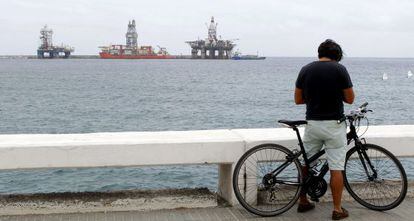Repsol to undertake first oil survey off Canary Islands alone
Spanish firm’s consortium partners will not take part in initial offshore exploration work


Oil giant Repsol will work alone during the first oil prospecting expedition in waters off the Canary Islands, sources familiar with the situation have told EL PAÍS.
The company chaired by Antonio Brufau is in talks with the other two members of the consortium – Germany’s RWE Dea and Australia’s Woodside – to exercise the option to embark on this initial offshore drilling project on its own.
Repsol, which leads the consortium with a 50-percent share, is also the operator in charge of carrying out the drilling. Woodside has a 30-percent stake.
Operation Sandía is planned for October or November, and will cost the flagship Spanish oil company around €120 million.
Repsol’s finances are in good health after receiving compensation for Argentina’s expropriation of YPF, and it can well afford to conduct the initial exploration for hydrocarbons alone.
Woodside is more focused on liquefied natural gas, while RWE Dea is undergoing a change in shareholders, meaning that the Canaries project is not a priority for either of them.
The exploration work will take place around 60 kilometers off the islands, very near the border with Morocco, which has itself conducted over a dozen oil surveys in the area. The maximum depth of the exploration will be 3,100 meters, far less than the 8,000 meters reached by Repsol off Brazil and the United States.
Undertaking the project by itself also carries the promise of greater profits if the search is successful. The company has estimated the probability of success at 33 percent.
A second survey named Chirimoya is still awaiting further decisions, but there is a chance that Repsol might go that alone as well. A third exploration, Zanahoria, has been authorized by Spanish officials but there are as yet no plans for drilling in that particular area.
Canaries residents, as well as many regional officials, have been vocal opponents of the drilling projects, claiming that any spill would devastate the environment and bring ruin to their economy, which is heavily reliant on tourism.










































